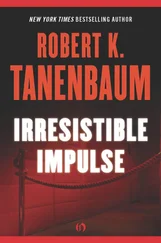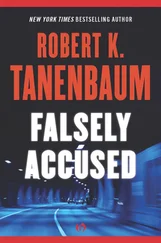Robert Tanenbaum - Justice Denied
Здесь есть возможность читать онлайн «Robert Tanenbaum - Justice Denied» весь текст электронной книги совершенно бесплатно (целиком полную версию без сокращений). В некоторых случаях можно слушать аудио, скачать через торрент в формате fb2 и присутствует краткое содержание. Год выпуска: 2010, Издательство: Open Road Integrated Media, Жанр: Криминальный детектив, на английском языке. Описание произведения, (предисловие) а так же отзывы посетителей доступны на портале библиотеки ЛибКат.
- Название:Justice Denied
- Автор:
- Издательство:Open Road Integrated Media
- Жанр:
- Год:2010
- ISBN:нет данных
- Рейтинг книги:3 / 5. Голосов: 1
-
Избранное:Добавить в избранное
- Отзывы:
-
Ваша оценка:
- 60
- 1
- 2
- 3
- 4
- 5
Justice Denied: краткое содержание, описание и аннотация
Предлагаем к чтению аннотацию, описание, краткое содержание или предисловие (зависит от того, что написал сам автор книги «Justice Denied»). Если вы не нашли необходимую информацию о книге — напишите в комментариях, мы постараемся отыскать её.
Justice Denied — читать онлайн бесплатно полную книгу (весь текст) целиком
Ниже представлен текст книги, разбитый по страницам. Система сохранения места последней прочитанной страницы, позволяет с удобством читать онлайн бесплатно книгу «Justice Denied», без необходимости каждый раз заново искать на чём Вы остановились. Поставьте закладку, и сможете в любой момент перейти на страницу, на которой закончили чтение.
Интервал:
Закладка:
“The parole officer?”
“And her sister, the one with the kid. It’s sounding better and better, and I know we’re going to get in because we absolutely have to get a break right now.” She blew him a kiss and whirled out the door.
Karp waited. Thirty seconds later she stuck her head in the door again, looking stunned. “Hey, if you’re on crutches for six weeks, how are you going to get up to the loft?”
“The penny drops,” said Karp. “As a matter of fact, I don’t know how I’m going to get up the stairs. But I can’t think about it today.”
She grinned. “Smart move. See you around, cutie,” she said, and closed the door.
Marlene took the elevator down from the sixth floor, where Karp had his office, to street level, and walked out of the special entrance reserved for the D.A.’s staff onto Leonard Street. She walked up Leonard to Church and a half block down Church to a branch New York State Parole office.
Inevitably, it was painted in the official bureaucratic colors, green to shoulder height and tan above, a scheme designed by famous scientists to increase suicidal tendencies, especially when lit by dim fluorescents. There were rows of plastic shell chairs in pleasing shades of avocado and pink, and a heavyset clerk with streaked black and blond hair who sat behind a glassed-in counter munching corn chips and talking on the phone. Four of the chairs were occupied by the kind of people who have to visit their parole officers on a regular basis.
Marlene went up to the clerk’s window and asked to see Geri Stone. The clerk continued talking and munching. Marlene asked again, louder. The clerk scowled and said, around a bolus of chip debris, “She’s with someone. Take a seat!”
Marlene sat on her anger and decided not to flash her ID and make a scene. This was, after all, a private mission. She took a seat. The clerk talked on behind her window. Time stopped.
At least twenty minutes later, the door opened again, and a pretty young woman entered, who belonged in such a place far less than even Marlene. She had her black hair cut in an artful shingle, she wore a mannish tweed suit that did not make her look mannish, and had that air of entitlement and confidence that even the City cannot strip from some bright and successful young women. Marlene checked the shoes and bag, found them expensive and tasteful, and thought, the girl’s made a mistake-probably looking for a brokerage.
But no, the woman advanced on the clerk’s station and, smiling, said, “Hi, Mavis, is Geri free?”
The clerk paused in her conversation and returned the smile. “Hi, Susan. I’ll buzz her.” Magic.
Marlene rose and went over to the woman. This had to be the sister, the one with the kid, thought the trained investigator, and so it was. Susan Weiner, mother of a three-year-old, an industrial designer, married to a rising TV producer, and a woman who obviously knew how to make New York sit up and beg. This information and this impression were conveyed to Marlene in a giddy rush as they walked together down a green, dimly lit hallway.
Weiner stopped by a frosted glass door, which opened, allowing the passage of a bullet-headed black man in his thirties, who glowered at them and brushed by so forcefully that they both had to jump back a step.
“A satisfied client,” laughed Weiner, and went into the little office.
Geri Stone was the older sister, by perhaps five years, which made her early thirties. She was rounded, blurry, where Susan was crisply cut and lean, and had adopted a stern proletarian plainness in contrast to her sister’s stylish flair. Her hair was a nondescript brown frizz, and she had on a lipstick that was too bright and a fuzzy sweater of an unfortunate blue shade that greened her sallow complexion.
She greeted her sister effusively.
“God, you look gorgeous. Get away from here, you’re so thin.”
“That’s a gorgeous sweater,” responded Susan. “Where’d you get it?”
And similar cooings. At length they noticed Marlene. Geri shook Marlene’s hand in a formal, manly grip. They were all to go to lunch, Geri’s suggestion when Marlene had called her to make contact with Susan. An odd arrangement, Marlene had thought at the time-why was Geri inviting herself along for a discussion about day-care? Now, of course, the reason was clear, a set of family dynamics you could explicate on the back of a business card. The dowdy social worker was in love with her glamorous sister.
They ate at a local bar. Geri turned out to be one of those people who justified their caloric intake by informing you about how little they had been eating for the past week. Marlene was not particularly hungry, but decided to order a cheeseburger with fries and a beer just for spite.
They chatted. Susan was witty and flippant, a game Marlene played back at her. Geri was more serious, in fact something of a bleeding heart. When Susan mentioned the guy who had almost knocked them down in the hall, Geri launched into his pathetic case history: mildly retarded, alcoholic, abused as a child, dragged through foster homes, a juvie sheet that went back to age twelve and a record of stupid petty crime that turned violent when he had a load on. She had struggled mightily to get him an early release from his last stretch and into a program that specialized in helping people with what she called “institutional malaise.”
“Hmm, interesting,” said Marlene, not really interested but making an effort to be polite in the face of a certain hostility she sensed coming from the parole officer. She was not sure whether this stemmed from her own job, as the kind of person whose delight it was to put poor, misunderstood victims of society in jail, or if it was a kind of jealousy for the attention of Susan Weiner.
Their food came. Geri fussed and harried the waitress over the crispness of her salad and the provenance of the salad dressing. Weiner caught Marlene’s eye and rolled her own slightly, along with an indulgent smile. We the Thin.
It would have been easy to dislike them both, Geri for her fussy self-righteousness, Susan for her air of unthinking entitlement, but Marlene found herself warming to them, not as individuals precisely, but to the relationship.
These two sisters had something that Marlene had only read about in books, the kind of spiritual closeness that had entranced female writers in the nineteenth century. Marlene had two sisters of her own, whom she loved, of course, but conventionally. Annie was a housewife with a brood of kids out on the Island. Pat was a city planner in Philadelphia. She saw them at birthdays and holidays, and there was warmth then but no real intimacy.
Marlene did not envy them, precisely. If she had been Susan, she would have found Geri’s combination of mother-hen advice and effusive praise unbearable. And as Geri, Susan’s blithe princess act would have driven her to violence. But it was oddly pleasant to bask in the warmth of their relationship, which was as rare in the circles Marlene frequented as hot-chestnut vendors in Midtown.
The lunch ended, not without (as Marlene had expected) an unbearable niggling over who owed what on the check, presided over by Geri, wielding a pencil. At the point when she was calculating the tip, to the nearest cent, Marlene whipped a twenty out of her wallet, snatched the check from Geri’s fingers, slapped the check and the bill on the table, and clunked a sugar dispenser down on both.
“My treat,” she said. “Let’s move, Susan.”
“God, yes,” said Weiner, glancing at her watch. “I already missed my Jazzercise.”
“Your Jazzercise-” said Geri. “Honestly, it’s like a religion with you.”
“You should try it, Geri, seriously, I’m always trying to get her off her behind. Do something! Marlene, you work out, right? What, aerobics?”
Читать дальшеИнтервал:
Закладка:
Похожие книги на «Justice Denied»
Представляем Вашему вниманию похожие книги на «Justice Denied» списком для выбора. Мы отобрали схожую по названию и смыслу литературу в надежде предоставить читателям больше вариантов отыскать новые, интересные, ещё непрочитанные произведения.
Обсуждение, отзывы о книге «Justice Denied» и просто собственные мнения читателей. Оставьте ваши комментарии, напишите, что Вы думаете о произведении, его смысле или главных героях. Укажите что конкретно понравилось, а что нет, и почему Вы так считаете.












